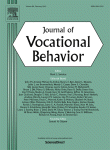Job search self-efficacy (JSSE) is one of the most studied variables in the job search literature and an important component of the theory of planned behavior and self-regulation theory which have both been used to explain the job search process. However, even though JSSE has been a part of job search research for thirty years, the measurement of JSSE has varied from study to study. This questions both the validity of the measures used and the findings from each study that used a different measure. In this paper, we propose and test a two dimensional measure of JSSE that corresponds to job search behavior (JSSE-B) and job search outcomes (JSSE-O). The results of a longitudinal study of employed and unemployed job seekers support a two-factor model corresponding to the two dimensions of JSSE. We also found differential relationships between each dimension of JSSE and several antecedents and consequences. Among the antecedents, environmental exploration and self-exploration were stronger predictors of JSSE-B while career planning was a stronger predictor of JSSE-O. In terms of consequences, JSSE-B was a stronger predictor of job search intention and behavior while JSSE-O was a stronger predictor of the number of job offers received. These findings provide support for two dimensions of JSSE and have important implications for job search research and practice.
Publication Type
- Article



